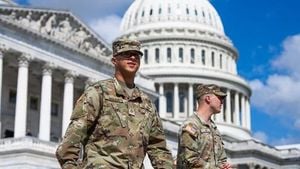On Friday, March 15, 2023, the U.S. Court of Appeals for the Eighth Circuit upheld the previous decision to ban TikTok, reinforcing this action as part of national security concerns. The government argues this popular social media platform could provide sensitive user data to the Chinese government, prompting widespread concern among users and advocates of digital freedom.
TikTok, which has exploded in popularity among teens and young adults, claims to honor user privacy and insists it does not share data with the Chinese government. Nevertheless, the fears surrounding user security paved the way for this latest legal battle, bringing together various stakeholders from different sectors.
Legally, the case stemmed from objections raised by multiple states and federal agencies, who positioned the app as not only a security risk but also potentially harmful to the mental health of younger users.
The ruling's impact was felt almost immediately, as TikTok's user base numbers began to shift. The company reported millions of downloads occurring before the ban was enacted, followed by user withdrawals, anxiety about data breaches, and rising awareness around digital security. The company’s spokesperson expressed disappointment, stating, "We are committed to protecting the privacy and security of our users. Our global leadership team has undertaken significant measures to address these concerns and fulfill expectations with integrity and transparency. We will continue to fight against this unjust ruling."
Many users and creators on the platform voiced their frustrations on other social media platforms, expressing concerns about their livelihoods. Several content creators, previously relying on TikTok for their primary income, have begun shifting to alternative platforms, seeking new ways to earn money and connect with their audiences.
Legal experts have indicated this case could set the precedent for how the government handles threats related to cybersecurity and data security going forward. Legal teams across the country are already preparing to challenge similar bans on other platforms.
While advocates argue this is merely another tactic to control internet freedom, government officials maintain it is strictly about protecting American citizens from potential foreign interference. For many, the distinction has felt ambiguous. The debate continues to spark discussion about digital rights, governmental authority, and user privacy.
Industry reactions have varied significantly. While some tech firms applaud the government’s efforts to prioritize user data security, others worry it creates dangerous precedents for censorship and misinformation. The tech community's divisions are becoming increasingly evident as platforms react to various charges of misconduct.
The TikTok ban marks the most recent chapter of heightened scrutiny faced by foreign tech companies, especially those tied to China. This scrutiny has surged since the 2020 presidential elections, where foreign interference became evident, prompting increased public vigilance.
This ban, combined with other nationwide legislative pushes to restrict certain communications technologies, positions TikTok as both a convenient target and emblematic of wider concerns about global technology and user privacy. Critics of the ban claim this action restricts freedoms of expression and stifles creativity.
While appealing the ruling, TikTok continues to advocate for its platform's unique ability to cultivate engagement and community within the social media ecosystem. Representatives insist they would comply with legislative demands through dedicated privacy policies, transparency reports, and third-party audits.
“We are prepared to go the extra mile to address these issues and improve the trustworthiness of TikTok. We hope to collaborate with elected officials to strengthen regulations to protect user data without sacrificing civil liberties,” said the spokesperson.
Across the nation, individual companies appear to have developed diverse strategies to counteract possible user withdrawal. Some are orchestrated weekly webinars with influencers sensitive to digital security to discuss protective measures and alternative platforms as backups should TikTok become irreversibly banned.
With the case poised to reach the Supreme Court, there are growing concerns about how higher rulings may resonate nationally. The legal process could take months, if not longer, as discussions around the case evolve. Social media law experts anticipate numerous issues around cybersecurity laws will emerge throughout the litigation, probing the thin line between user privacy and government oversight.
Tech policy analysts have pointed out how this ruling encapsulates broader concerns about the flow of information across international borders. Its ramifications touch on intellectual property, trade relationships, and, critically, individual freedoms.
All eyes remain on Capitol Hill as lawmakers navigate this complicated digital terrain, striving to maintain user rights amid growing cybersecurity concerns. The TikTok saga may encompass larger discussions about technology’s role within society, balancing innovation and safety – areas where effective governance can build public trust.
Rounding up the contentious issue, the notion of what constitutes freedom of expression has been thrust back to the forefront. How government interactions on the accessibility of social networks will evolve seems more uncertain than ever. This latest ruling will undoubtedly stir discussions as it sets precedents for the future of digital communication and privacy.
For TikTok users nationwide, the future remains uncertain as the appeals process could take considerable time, leaving many to ponder whether the fun of sharing video clips will become yet another casualty of widening data privacy concerns.



